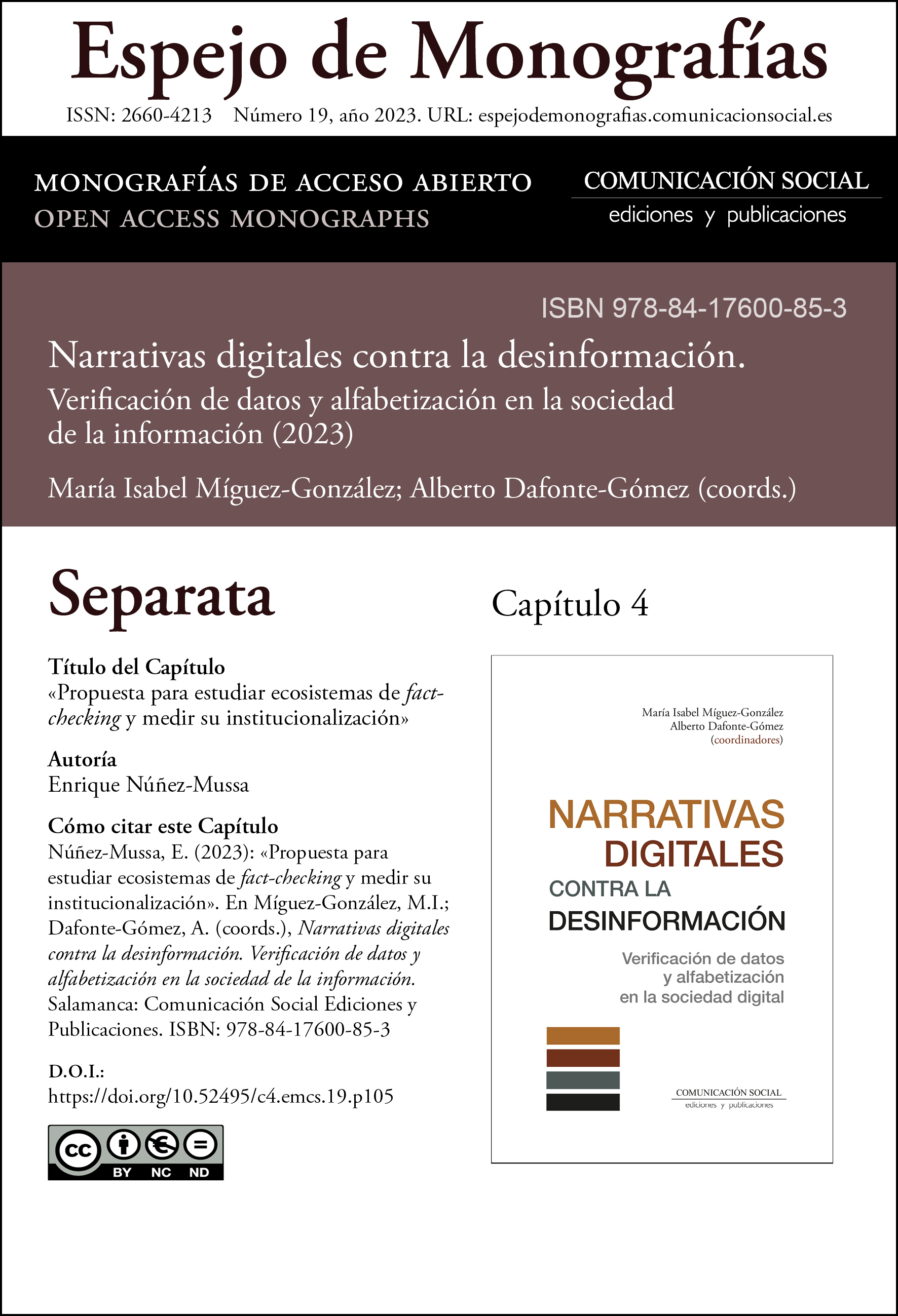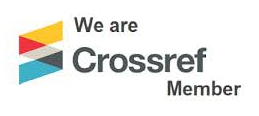Capítulo 4. Propuesta para estudiar ecosistemas de fact-checking y medir su institucionalización
DOI:
https://doi.org/10.52495/c4.emcs.19.p105Palabras clave:
ecosistemas de fact-checking, fact-checking, investigación comparada, verificaciónResumen
Este capítulo propone que al momento de agrupar y estudiar ecosistemas de fact-checking, un criterio a considerar sea su institucionalización periodística, sugiriendo parámetros para establecer trayectorias y comparaciones entre proyectos internacionales y dentro de un mismo país. La propuesta se sustenta en un ejercicio exploratorio aplicado a una muestra de 18 países, donde se consideró la cantidad de proyectos por país, la colaboración entre iniciativas independientes y medios de comunicación masivos, y la existencia de verificadores de referencia que hacen actividades que van más allá del periodismo, por ejemplo, alfabetización mediática. Los resultados, permiten sugerir parámetros adicionales y muestran que al considerar la institucionalización como criterio surgen grupos que no serían asociados por idioma o región.
Descargas
Citas
Amazeen, M. (2017): «Journalistic interventions: The structural factors affecting the global emergence of fact-checking». Journalism: Theory, Practice & Criticism, vol. 21, núm. 1, https://doi.org/10.1177/1464884917730217.
Graves, L. (2018): «Boundaries Not Drawn. Journalism Studies, vol. 19, núm. 5, pp. 613-631, https://doi.org/10.1080/1461670X.2016.1196602
Graves, L.; Konieczna, M. (2015): «Sharing the news: Journalistic collaboration as field repair». International Journal of Communication, vol. 9, núm. 1, pp. 1966-1984.
Graves, L.; Cherubini, F. (2016): «Fact Checking Sites in Europe». Oxford, vol. 40.
Graves, L.; Lauer, L. (2020): «From Movement to Institution: The «Global Fact» Summit as a Field-Configuring Event». Sociologica, vol. 14, núm. 2, pp. 157-174. https://doi.org/10.6092/issn.1971-8853/11154
Humprecht, E. (2019): «How Do They Debunk «Fake News»? A Cross-National Comparison of Transparency in Fact Checks». Digital Journalism, https://doi.org/10.1080/21670811.2019.1691031
IFCN. (2023a): «Eligibility to be a signatory». International fact checking network. https://www.ifcncodeofprinciples.poynter.org/know-more/the-commitments-of-the-code-of-principles
IFCN. (2023b): «State of the Fact-Checkers 2022». International fact checking network. https://www.poynter.org/wp-content/uploads/2023/04/IFCN_2023_StateFactCheckers2022_v7a-1.pdf
Mayerhöffer, E.; Belluati, M.; DeCillia, B.; d’Haenens, L.; Fubini, A.; Lo, W.H.; Núñez-Mussa, E.; Ólafsson, J.G.; Rega, R. (2022): «Countering misinformation in and from the newsroom: How digital platforms redefine journalistic practice and the democratic role of news media». In J. Trappel; T. Tomaz (Eds.), Success and failure in news media performance: Comparative analysis in the Media for Democracy Monitor 2021 (pp. 35–58). Nordicom, University of Gothenburg. https://doi.org/10.48335/9789188855589-2
Núñez-Mussa, E. (2019): «Political turmoil sparked a national fact-checking ecosystem in Chile: 17 platforms are active now». Poynter Institute-International Fact Checking Network. https://www.poynter.org/fact-checking/2019/political-turmoil-sparked-a-national-fact-checking-ecosystem-in-chile-17-platforms-are-active-now/
Núñez-Mussa, E. (2021): «Chile: Crisis of trust and a precarious industry». In J. Trappel; T. Tomaz (Eds.), The Media for Democracy Monitor 2021: How leading news media survive digital transformation (Vol. 2) (pp. 85–146). Nordicom, University of Gothenburg. https://doi.org/10.48335/9789188855428-3 https://bit.ly/3zk78xc
Ryfe, D. (2019): «Institutional Theory and Journalism». The International Encyclopedia of Journalism Studies, Wiley, pp. 1-5.
Singer, J.B. (2020): «Border patrol: The rise and role of fact-checkers and their challenge to journalists’ normative boundaries». Journalism, vol. 22, núm. 8, https://doi.org/10.1177/1464884920933137
Stencel, M.; Ryan, E.; Luther, J. (2022): «Fact-checkers extend their global reach with 391 outlets, but growth has slowed». Duke Repoters Lab. https://reporterslab.org/category/fact-checking/
Trappel, J.; Tomaz, T. (2021): The Media for Democracy Monitor 2021: How leading news media survive digital transformation (Vol. 1& 2) Nordicom, University of Gothenburg.
Vos, T.P.; Thomas, R.J. (2018): «The discursive construction of journalistic authority in a post-truth age». Journalism Studies, vol. 19, núm. 13, pp. 2001-2010, Doi: 10.1080/1461670X.2018.1492879

Publicado
Cómo citar
Número
Sección
Licencia

Esta obra está bajo una licencia internacional Creative Commons Atribución-NoComercial 4.0.
Los artículos publicados en la revista se distribuyen con la Licencia Creative Commons Atribución-NoComercial-SinDerivadas 4.0 Internacional










